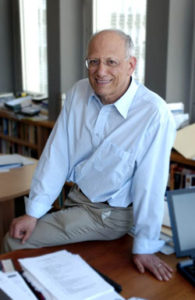Aussies more accepting of migration than ever – Scanlon Report
Migration is now less of a divisive issue for Australians than at any point in the past decade, according to the latest Mapping Social Cohesion survey by the Scanlon Foundation and Monash University.
But levels of race discrimination and mistrust in Australia’s political system are on the rise.
The survey’s author, Professor Andrew Markus, says the results are at odds with current media and political narratives about an apparent rise in concern about migration and its impact on Australian society.

Prof Andrew Markus
The survey found only 34 per cent of respondents regarded Australia’s intake rate as “too high” – a result that shows little change from last year and is in line with other major surveys.
“Attitudes to migration have become less volatile and Australians appear to be accepting the benefits – this is because, I think, that in Australia multiculturalism isn’t so much about protecting pluralism but about integration and bringing people together,” Professor Markus said.
He said 80 per cent of those surveyed also expressed support for Australia’s humanitarian program, including the intake of refugees from Syria.
But he said 61 per cent disapproved of asylum seekers who reach Australia by boat.
“That’s been a consistent feature, I would say, of polling for the last 15 or so years. People draw a distinction between an immigration program which is regulated by the government and boat arrivals,” he said.
“Australians are generous and willing to embrace diversity but they want a program that the government is in control of and is regulating.”
The survey, conducted amid the landscape of the Brexit vote in the UK and election of Donald Trump as US President elect, showed more evidence of stability and social cohesion in Australia than disruptive change.
The survey found 91 per cent of people professed a sense of belonging in Australia with 89 per cent expressing pride in our way of life.
Eight-three per cent said multiculturalism had been a good thing for Australia – in keeping with the results of previous surveys – and 66 per cent said Australians should do more to learn about the culture and customs of different ethnic and cultural groups in the country.
Mistrust of Muslims persists, the survey showed, with 25 per cent expressing a negative view of the religion but 68 per cent of people said there should be no discrimination based on religion in the acceptance of migrants and refugees.
But Professor Markus said the level of negative attitudes to Muslims had not changed significantly across all of the surveys since 2007.
“The current discourse in the media and elsewhere that Australians have gone sour on Muslims is not supported by the survey,” he said.
The survey found discrimination on the grounds of race, religion or ethnicity had risen with 20 per cent of respondents saying they had witnessed it in 2016 – compared with just 15 per cent in 2015.
And fear of crime is also on the rise with 36 per cent citing it as concern compared with 26 per cent last year.
This year’s survey is the ninth since the first benchmark survey in 2007 and has now canvassed more than 35,000 Australians residents over that time.
It pointed out that population growth in Australia is below the average over the past fifty year at just 1.4 per cent.
The survey aggregated all of the findings around general acceptance and rejection of cultural diversity and immigration. It found 12 per cent of the population with strong negative attitudes and 22 per cent with strong positive attitudes.
“So we have this split with 12 per cent of people rejecting diversity – and these are the people you might hear on talkback radio – and 22 per cent people accepting of diversity but who are perhaps much quieter,” Professor Markus said.
The state-by-state aggregated figures varied significantly with Victoria, the state most accepting cultural diversity and immigration.
In Victoria there were 9 per cent negative and 31 per cent positive cohorts compared with around 15 per cent negative and 15-18 per cent positive cohorts in NSW and Queensland.
Professor Markus said the survey showed more stability than change in relation to social cohesion but he warned there had been a consistent shift in opinion – albeit of less than five per cent – but in a negative direction.
“Given we are living an unstable, volatile political environment, this is a cause of some concern,” he said.
The survey showed low levels of trust in federal parliament with 31 per cent of respondents saying major change was needed in the political system – up from 11 per cent in 2014.
“Our politicians have not built up trust which leaves us susceptible in the event of a major shock – such as a mass terror event – to significant political and social turmoil,” Prof Markus said.
Laurie Nowell
AMES Australia Senior Journalist












